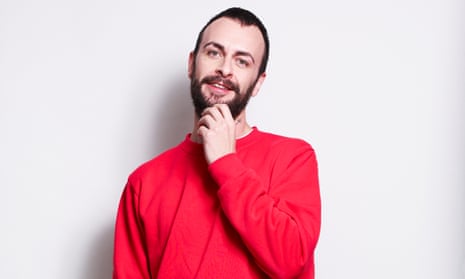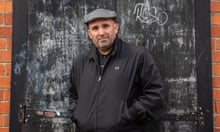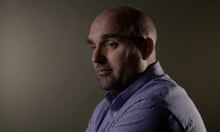Only a minute after meeting Joseph Gilgun, he starts to tell me about his Grandma Sadie. He says my Dictaphone looks like a beard trimmer and it reminds him of Sadie because she used to shave her beard with one. “I loved my Grandma Sadie, she were amazing. I think she was quite a tough old bird, really.” He conjures up a memory of his grandparents’ council house in Chorley. “It always smelled of stale Superkings, because she smoked in the house, and this strong smell of tea, because she used to reuse her tea bags.” He goes back to being eight years old, in trouble, with his cousin, shut in the bedroom. “I think we were being bollocked, me and our Carl. And we check the drawer, and for whatever reason, there’s a fucking machete in it. Like, a huge machete! You could chop a child’s head off with it. And me and Carl were at an age where one of us might actually use it on the other,” he grins. He sits back in his chair, his tattooed legs stretching out. “Anyway!”
This is a typical Gilgun yarn. He is a warm and vivid storyteller who could chat for England, all packaged up in puppyish enthusiasm. Whether he’s explaining the difficulties of sourcing an antique, Grecian-style dildo that a canine co-star could wrap its jaws around – a saga that turned out to be far more fraught than you might expect – or speaking frankly about his bipolar diagnosis, he is never lost for words, which is how he ended up creating Brassic, a loose and fond reimagining of some of the adventures he got up to as a teenager in Lancashire.
Back in 2014, when he was shooting the film Pride, he started to tell his co-star Dominic West about the attempted theft of a Shetland pony. West wisely suggested Gilgun turn it into television, so he did. He paired up with Shameless and Clocking Off writer Danny Brocklehurst, who gave the ideas some shape. At Gilgun’s insistence, West appears in the show as a terrible, self-involved GP.
Gilgun is 35, but he’s been acting since he was a child, when an educational psychologist suggested he should take part in drama workshops. He joined Coronation Street at 10, and then Emmerdale in his early 20s, but it was his turn as Woody in This Is England that made him into a star, of which that familiar “Lol” tattoo is a reminder, spelling out the name of his character’s true love.
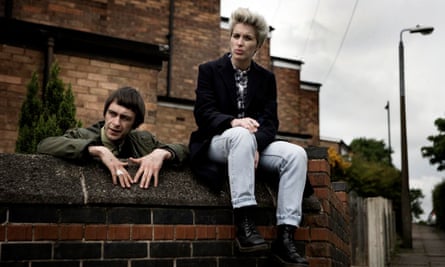
For the past few years, he’s been spending time in the States, playing Cassidy, the alcoholic Irish vampire in the big-budget comic-book adaptation Preacher, but the fourth and final season has finished shooting. Brassic, then, is a return of sorts for Gilgun. “It’s pretty autobiographical,” he nods. “I can’t go into the criminality. I’ll leave that to the viewers to decide what’s real from what isn’t,” he says, smiling, “but a lot of that shit has gone down.”
Gilgun grew up with his two sisters in Rivington, a few miles north of Wigan, where his dad worked in a metalworking factory that made parts for boilers. “He was a fucking hero. He’d cycle to work, all the way to Wigan. He was a strong man and he’d work these long hours at the foundry, cycle back, play for hours with us kids. He was a brilliant dad. And my mum was a very sensitive, liberal lady, always has been. Puts on a posh voice, depending on what company she’s in.”
At primary school, a teacher picked up on the signs that Gilgun might be dyslexic. He would write things backwards, and grow easily frustrated when he couldn’t do the work. He remembers having to write his first essay. “We had to fill an A4 page with writing, and it was so stressful that I was physically sick.” Now, he says, he has a personal assistant. “Not because I need a smoothie at three o’clock in the morning – it’s because I can’t read a single email.”
When he was 11, his parents split up, and around that same time, his dad was made redundant. “Tough age, you know. Couldn’t figure it out. I really struggled and I was very angry for a long time, but my job has afforded me the opportunity to do a bit of therapy, and that’s just been fucking huge.” The trouble with therapy, he says, is that it’s not nearly as accessible as it needs to be. “There’s not that many therapists and there’s so many people with mental health issues. You need talking therapy, but it’s just not available. If I go to my doctor and say, ‘I’m having suicidal thoughts’, they’ll go, ‘Right, well, I can give you some therapy… there’s a three-month waiting list’.” Gilgun wrote this into Brassic; its funniest moments are often its blackest.
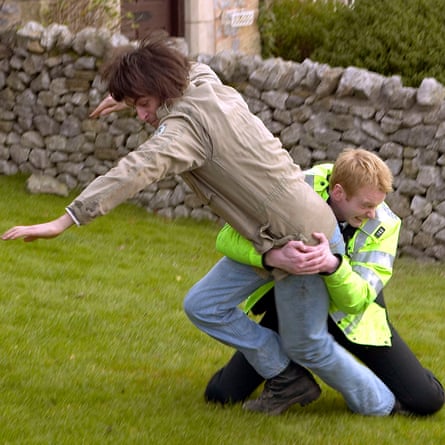
When he was a teenager, Gilgun was prescribed antidepressants. “I’d been a difficult child, a very emotional young man, kicking off about something, or fucking bawling my eyes out, heartbroken.” His mother told him that the family had come to expect these “catastrophes”, as he calls them, once a month or so. “We’d always talk like: Joseph’s due one of his meltdowns.” But by 17, the situation had become untenable. “Mum and Dad had separated, life was starting to really change. I was in the process of going off the fucking rails, deeply unhappy.” He’d heard that the GP would hand out pills that could make him happy, so he made an appointment. At first, the doctor did offer him counselling. “But it was a long wait and I needed help there and then.” He took the antidepressants instead. “I ended up on these drugs for years. They’d put me on one, I’d go all the way up to the highest dose, then it’d stop working again and I’d go on to another, go all the way up to the highest dose, taken off that, go on to another. I’ve been on everything, dude.”
At 26, Gilgun had been cast in Misfits as Rudy, a character split into two versions of himself – one upbeat, confident and gregarious, the other melancholy, insecure and uncertain. It was a demanding role, because he was playing two people. “And I have this colossal fucking meltdown: I’m not eating, I’m not sleeping… all this shit that I go through every time.” He starts to choke up when he remembers the kindness of the show’s producer, Matt Strevens, who got him to a private doctor (“posh, he looked like the fucking lion out of Narnia”), who told him that the medication he’d been on for years had been damaging his mental health. “He said, ‘Everything you’ve taken on the list I can see in front of me is detrimental to someone who suffers with bipolar – which, by the way, you have’.” Up until that point, Gilgun had no idea. It was the first time he’d been given a proper diagnosis.
Gilgun is extraordinarily open about his mental health. “I mean, I understand that it makes me vulnerable, but I’m prepared to go to that place for the sake of anyone who’s suffered like I have.” If anyone recognises something in themselves from him talking about it publicly, he says, he’d like them to know they could speak to their doctor about it. “Go and ask, go and fill out the form, go through the bullshit system they have in place.” He catches himself; he is insistent that he’s not criticising the NHS. They simply need more money, to allow them to take better, less catch-all approaches to complex disorders. “You know, we slag off our NHS like there’s no tomorrow, but they’re not sitting there with their thumbs up their arse, they’re genuinely trying to fix shit. I think our NHS is incredible. We’re so lucky to have them and they work as hard as they possibly can. But the system ain’t right and it is failing people everywhere. I’m one of them. It’s taken me until 35 to be on the right medicine.”
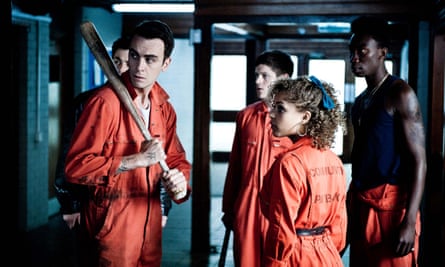
Working as an actor, then, has been a double-edged sword for Gilgun. On the one hand, it’s given him access to healthcare that he would not have had otherwise. He has weekly therapy now, and the environment he works in provides him with discipline. He is strict about being on set on time, and always knowing his lines. “It’s fucking hard up here, like, super hard,” he says, tapping his head. “This head of mine never rests. Do not make the assumption that because somebody has got mental health issues they are weak-minded. That person is terrified, anxious. Getting out of bed alone has been a huge, monumental task. Getting in that shower, brushing the teeth, somehow managing to eat their breakfast… Some will have children, and they have to go and do exactly the same thing you do at work, only they’re suffering like that. Now that to me is a fucking hard dude or gal.”
On the other hand, there are some parts of his job, and some roles in particular, that have taken it out of him. “I almost enjoy the fact, in a sadistic way, that a part is going to damage me a little bit,” he explains. This Is England was one of those roles. When Woody found himself cut off from the gang, Gilgun cut himself off from the cast, who are his close friends in real life. “That was a difficult thing to do.” They filmed in Sheffield, where he didn’t know anyone else. “Essentially I’m on my own in a flat, locked away. The lines get very, very blurred.”
Though it borrows from Gilgun’s youth, there is a sense that Brassic shows a parallel life for Gilgun, a what-could-have-been, had his acting career not taken off. “Definitely,” he agrees. “I mean, I was a bad kid, but I wasn’t El Chapo. I’d sell a bit of weed and I’d shift a bit of gear. I’ll not go into details. But I think [Gilgun’s character] Vinnie is someone I could have ended up being.” He points out that in a lot of his roles, his character has been surrounded by a close group of friends: Misfits, This Is England and even Preacher are about tight friendships. “And I’m not very social. I spend a lot of time on my own. The few friends I do have, I rarely see, and I keep them at a distance. I think I feel guilty for doing well.” Vinnie, meanwhile, is always there for his mates, and rarely alone. “It’s a version [of me] that I’d like to be, you know. I’d love to be that guy who’s not a flakey friend, who does turn up to weddings and parties, but I’m not him. I don’t know if I ever will be.”
In the core Brassic gang, one of the characters, Tommo, is a committed lothario who has sex with men and women, while hardman Ash is an Irish Traveller who happens to be gay. “We’re not making a fucking comment,” says Gilgun, shrugging. “It makes no difference. In a working-class community, often you are accepted for the oddball you’ve become. The working classes go through a very specific filtration system that’s different to the middle and upper classes, and a lot of that is based around survival. As a result of that, you get these huge personalities – they’re fucking nuts, you know – and you just accept them.” He fondly mentions local characters from his home town, eccentrics who nobody would dare mess with. “You know, the show is an unapologetic comment on what it is to be working-class,” says Gilgun. “We’re not all miserable. Some of the happiest people I know have got fuck all.”
One of the more surprising truthful elements of Brassic is that, like Vinnie, Gilgun does actually live out in the woods, in a derelict house in the north west, that he’s slowly doing up, with the help of his mum and his sisters. He broke in through a skylight one day, he says, and just started living there. “When I first moved in, I lived in a tent in the house because there was this big hole in the ceiling.” When he was filming Preacher, the American network would put him up in “these multimillion-dollar eco houses”, so it was quite the contrast. “I go straight back into the derelict house where there’s no hot water and I can’t really flush the toilet properly without throwing a bucket down it.”
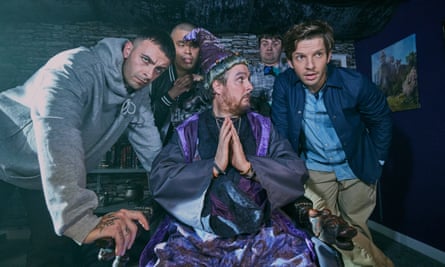
He’s never been the kind of person who hankers for material stuff. “I don’t have a nice car. I have two bikes, I like trainers, I like tattoos, quite like gold teeth.” He flashes a gold-free smile. “I might get some of them made.” He was talking to his therapist about all of this recently. “I had a bit of a breakthrough. She was saying, ‘Why don’t you have a girlfriend? Why don’t you have a house? You’ve got all this money. Do something with it.’” He says that, partly, he doesn’t feel worthy of it. “But the other aspect is, once I’ve got a girl that I know I can love and she loves me, that’s when I’ll do it. I’ll get a house and I’ll learn to drive and I’ll become a normal human being, get a golden retriever and a fucking dishwasher and all that. I’ll give it everything I have. I’ve never really had that love, being in love like that.” He says it’s hard, because of his bipolar, but also because of his work, which means he’s away a lot. “I can’t meet anyone. I’m nice, as well!” So he’s just put himself on Tinder. “But it’s difficult. No one’s in the market for a bipolar squatter who lives in the fucking woods, do you know what I mean?”
Gilgun has already got his next project lined up. It’s early days, so he’s not allowed to say what it is, but Brassic has given him a taste for the creative side. “I’ve got loads of ideas and for the first time in my life, I’ve got the confidence to be able to sit up and go, hey, they’re fucking brilliant.” I tell him I loved Brassic. By the end of it, I cared deeply about all of the characters, especially Vinnie. He looks pleased. “Some of it is real, so you’re watching someone’s life. There’s a truth to all of it. Even though we’re doing crazy things like robbing horses.” He mentions a rule that they would never play a scene for laughs. If he caught an actor doing it, he’d immediately stop them. “Because what we’re doing is mad enough. You don’t have to add to that,” he smiles. “It’s already fucking mental.”
All episodes of Brassic will be available on Sky One and Now TV from 22 August
